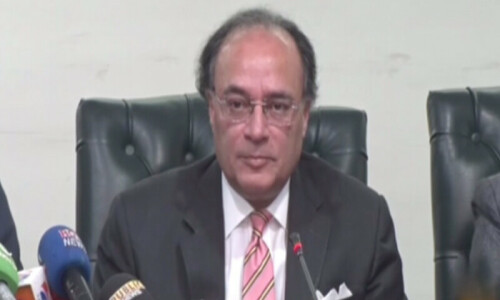
ISLAMABAD: Finding Pakistan Tehreek-i-Insaf chairman Imran Khan’s reply in the contempt proceedings against him ‘unsatisfactory’, the Islamabad High Court (IHC) on Wednesday observed it was not a reply of a leader of his stature but provided another opportunity to him to furnish an appropriate and well-thought-out response.
A five-judge bench, headed by IHC Chief Justice Athar Minallah and also comprising Justice Mohsin Akhtar Kayani, Justice Miangul Hassan Aurangzeb, Justice Tariq Mehmood Jahangiri and Justice Babar Sattar, reminded Advocate Hamid Khan, counsel for the ex-premier, to be mindful while drafting the reply that the high court was bound by the apex court convictions in contempt proceedings against Pakistan Muslim League-Nawaz leaders Talal Chaudhry, Daniyal Aziz and Nihal Hashmi in 2018 and a separate case against Dr Fidaus Ashiq Awan in 2020.
The IHC had taken up the contempt case against Mr Khan over his intimidating remarks against Additional District and Sessions Judge Zeba Chaudhry at a public rally in Islamabad’s F-9 Park on Aug 20.
Attired in white shalwar kameez suit with a rosary in his left hand, Mr Khan sat quietly in the courtroom along with his party leaders Shah Mehmood Qureshi, Asad Umar, Shibli Faraz and Faisal Javed. Police had cordoned off the entire court premises and no one except with special passes were allowed to enter the premises.
Even a word from leaders with such a huge following can create risks for their intended targets, observes IHC CJ
The IHC chief justice reminded the counsel that district court judges were not less important than the high court or apex court judges, as the masses access the district judiciary, besides the environment in which the subordinate judiciary works was commendable.
“District courts represent the trust and confidence of the ordinary people,” Justice Minallah observed, also reminding the counsel that the gravity of the contempt case must be realized by his client also dropping hints to show some remorse for the uncharitable remarks against the district judicial officer.
Justice Aurangzeb, at the hearing, remarked that the CJ had given many openings to Mr Khan, also reminding his counsel that the case could have been closed the same day had appropriate reply been filed.
“We are not inclined to discharge the notice having found the reply by Imran Khan to be unsatisfactory, though the reply had pleaded to discharge the show-cause notice in the contempt case,” said a two-page order.
With the consent of the parties, the high court also appointed the Pakistan Bar Council, senior counsel Munir A. Malik and Makhdoom Ali Khan as amici curiae to assist the court with a direction that the counsel for Mr Khan would provide copies of the supplementary reply he would file in advance to Attorney General for Pakistan Ashtar Ausaf – the prosecutor general in the case – as well as the amici curiae.
The case will be taken up again on Sept 8.
The court also assured the parties that contempt proceedings would be kept transparent, as even Amnesty International representatives have been allowed to watch the proceedings.
Justice Minallah reminded the counsel that every word uttered by political leaders with huge following had the “potential of creating and presenting clear threat” to the persons against whom such statements were made.
Referring to the allegations of torture on PTI leader Shahbaz Gill, the chief justice remarked that the controversial statement was made despite the fact that the acting chief justice was already seized with the matter. “Was such a statement justified,” the CJ wondered.
Justice Minallah questioned whether the Adiyala Jail superintendent, who was under the authority of the Punjab government, accept the judicial custody of a prisoner if he was badly tortured?
The court also referred to enforced disappearances as ‘the worst-ever torture’, the case of a missing Baloch student from Islamabad and the Jan 22, 2021 letter by the UN rapporteur to the state of Pakistan in which the incidents meted out to journalists such as Matiullah Jan, Asad Toor, and Absar Alam were mentioned. “This court has been referring the cases of torture to the federal government for the last three years and had these matters be taken up by the government with the same zeal and zest, the situation would have been different today,” the chief justice deplored.
Explaining why contempt matters were serious in nature, Justice Minallah said the courts were there to serve the people, but any “obstruction in the administration of justice” became a serious matter. About a smear campaign against the opening of courts at midnight, the chief justice said the courts were opened to prevent the repetition of Oct 12, 1999 when the PML-N government was sacked in a military coup.
“We never respond to such allegations but the courts are available 24 hours for the weak and our only concern is to uphold civilian supremacy and the Constitution,” the chief justice observed.
He deplored how some political leaders abused social media and recalled that even his private picture with a Supreme Court judge went viral and someone accused himself of “receiving a flat as a gift”. But such matters did not affect the high court judges even if hundreds of thousands of political activists surrounded the court, the chief justice said, adding that if the political leaders did not uphold the dignity, respect and prestige of the judiciary, there would be a chaos.
The chief justice also observed change would come only if every institution functioned within the confines of the Constitution. While pointing towards the AGP, Justice Minallah said it was regrettable that the present government was filing terrorism and sedition cases against opponents, and also suggesting to enforce Police Order in the federal capital.
Published in Dawn, September 1st, 2022













































